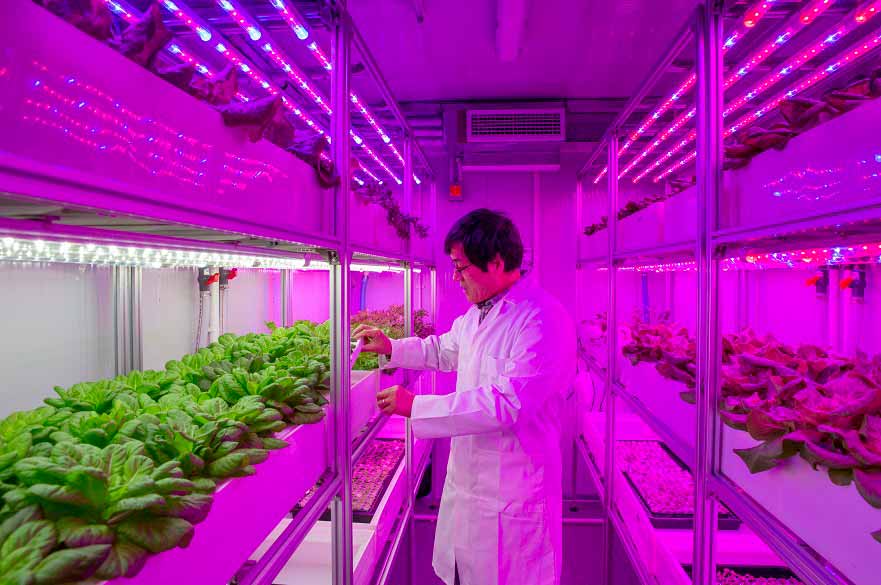Vertical ‘container farms’ can produce bigger and better natural crops
Two vertical ‘container farms’ capable of producing natural crops which are more nutritious, have far bigger yields – and are ready to harvest in at least half the time – have been created by Nottingham Trent University.
By Dave Rogers | Published on 22 March 2019
Categories: Press office; Research; School of Animal, Rural and Environmental Sciences;

The farms, thought to be the first of their kind in the UK and housed inside two converted shipping containers, use a variety of innovative and automated feeding and environmental control systems to create perfect growing conditions all year round.
Each container farm is capable of producing three to five tonnes of crops a year.
Scientists in university’s School of Animal, Rural and Environmental Sciences plan to use them for teaching and research – and to showcase the potential for ‘precision agriculture’ in a time of global challenges for food security and safety.
Nearly 70% of the UK’s fruit and vegetables currently comes from outside the UK and there is concern that food imports could become more expensive post-Brexit and that there could be significant disruption to the UK’s food supply chain.
An increasing world population, climate change, and pressure on natural resources which threaten global food security, are other major challenges.
The farms, located at the Brackenhurst Campus, have been created as part of a project with scientists at Huazhong University of Science and Technology in China.
Produce is grown vertically on racks using various LED light and nutrient ‘recipes’ to stimulate growth, depending on the particular species, variety of crop and its different developmental stages.
Suitable wavelengths of light enhance plant growth, giving crops higher yields, more flavour and increased nutrition.
Plants are also grown using include hydroponics – growing plants without soil in a nutrient-rich solution – and aeroponics, whereby plant roots are suspended mid-air in high humidity, whilst being intermittently misted with a nutrient solution.
Unique recipes of the 17 different nutrients which control crop quality and flavour are automatically monitored and delivered to each plant via a software-based control system.
Delivering these directly to the roots ensures almost all nutrients are taken up by the plant – hence bigger yields, faster growth and improved nutrition.
Only about 30%-40% of nutrients are taken up by the roots when grown in soil.
In addition to this, the project tackles the need to increase efficiency of nutrients and the protected conditions of the container mean there is no need for pesticides or fungicides.
“We want to address food security and sustainable agriculture issues by developing new farming systems which can provide an improved crop quality and yield,” said Chungui Lu, Professor of Sustainable Agriculture in the university’s School of Animal, Rural and Environmental Sciences.
He said: “We believe that there is enormous potential for urban agriculture and ‘”vertical farming to meet these emerging challenges. Container farms have optimum growing conditions from germination right through to harvest. It is a hugely efficient and sustainable way of growing very fresh vegetables and some fruit all year round.
“Container farms the size of ours would be able to produce three to five tonnes of crops per year. Producing natural and sustainable local food under such protected conditions could be very attractive for a range of organisations, such as supermarkets and restaurants. The system is also completely autonomous so people wouldn’t need to know how to operate it.”
Notes for Editors
Press enquiries please contact Dave Rogers, Public Relations Manager, on telephone +44 (0)115 848 8782, or via email.
Nottingham Trent University (NTU) was named University of the Year 2017 at the Times Higher Education Awards, and Modern University of the Year in the Times and Sunday Times Good University Guide 2018. These awards recognise NTU for its high levels of student satisfaction, its quality of teaching, its engagement with employers, and its overall student experience.
NTU has been rated Gold in the Government’s Teaching Excellence Framework – the highest ranking available.
NTU is one of the largest UK universities. With nearly 32,000 students and more than 4,000 staff located across four campuses, the University contributes £900m to the UK economy every year. It is one of the UK’s most environmentally friendly universities, containing some of the sector’s most inspiring and efficient award-winning buildings. 96% of its graduates go on to employment or further education within six months of leaving.
Our student satisfaction is high: NTU achieved an 88% satisfaction score in the 2018 National Student Satisfaction Survey.
The University is passionate about creating opportunities and its extensive outreach programme is designed to enable Nottingham Trent to be a vehicle for social mobility. NTU is among the UK’s top five recruiters of students from disadvantaged backgrounds.
NTU is home to world-class research, and won The Queen’s Anniversary Prize in 2015 – the highest national honour for a UK university. It recognised the University’s pioneering projects to improve weapons and explosives detection in luggage; enable safer production of powdered infant formula; and combat food fraud.
With an international student population of over 3,000 from around 100 countries, the University prides itself on its global outlook